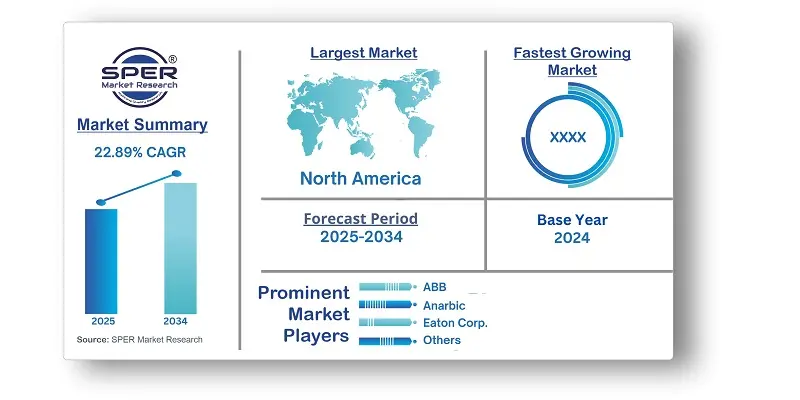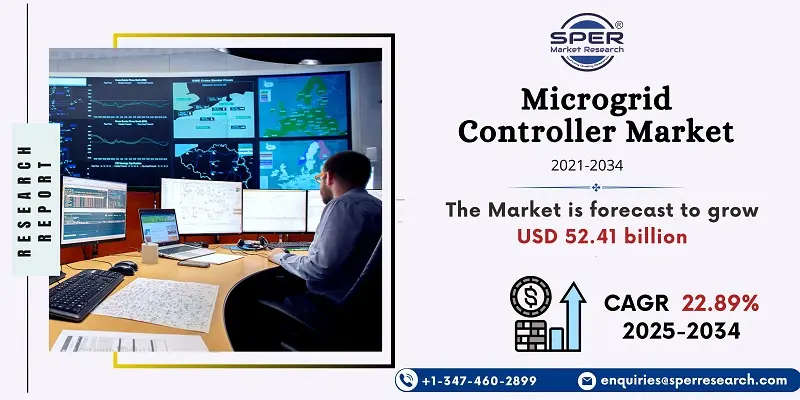Global Microgrid Controller Market Introduction and Overview
According to SPER Market Research, the Global Microgrid Controller Market is estimated to reach USD 52.41 billion by 2034 with a CAGR of 22.89%.
The report includes an in-depth analysis of the Global Microgrid Controller Market, including market size and trends, product mix, Vehicle Type, and supplier analysis. The global microgrid controller market is experiencing significant growth driven by the rising demand for reliable, efficient, and resilient energy systems. Microgrid controllers play a crucial role in managing distributed energy resources, optimizing power flow, and ensuring seamless islanding and grid connectivity. Increasing adoption of renewable energy, government support for smart grid technologies, and the need for energy access in remote areas are key market drivers. Technological advancements in automation, IoT, and artificial intelligence further enhance controller capabilities, boosting deployment across commercial, industrial, and utility sectors. Additionally, growing concerns over grid instability and the push for decarbonization are accelerating investments in microgrid infrastructure worldwide, positioning microgrid controllers as a critical component in modern energy management solutions.

By Power source Insights
The global market was dominated by the Combined Heat & Power (CHP) power source sector, which also contributed significantly to total revenue in 2024. The segment growth is anticipated to be significantly impacted by the shift in preference from traditional Separate Heat & Power (SHP) systems to energy generation from a single fuel.
Support from industrialized nations like the United States, Germany, the United Kingdom, and Japan to increase the amount of power generated by solar energy will be beneficial.
By Product Insights
The grid-connected product category led the global market and accounted for a noteworthy percentage of the overall revenue share in 2024. The increased popularity of smart micro-grid-connected PV systems to provide electricity to consumers by decreasing transmission losses is predicted to have a considerable impact.
In both urban and rural locations with little or no access to the main grid, grid-connected microgrids are growing in popularity. Grid-connected microgrids have grown in popularity because of the expansion of distributed energy resources like solar panels and energy storage devices.
By Application Insights
In 2024, this market was dominated by the education segment, which accounted for a significant portion of total revenue. It is anticipated that increasing government spending on the development of educational infrastructure will benefit developing nations like China and India by guaranteeing schooling in rural areas.
The military industry is rapidly employing microgrids to increase energy security and lessen its dependency on conventional fuel sources, while microgrids are also being used to supply backup power during outages, which is crucial for vital facilities like hospitals and data centers.
By Regional Insights
In 2024, North America dominated the global market and contributed significantly to total revenue. It is anticipated that a significant impact will result from the high rate of adoption of captive power generation techniques in the U.S. industrial and municipal sectors to lessen dependency on the government-controlled power supply. One of the main drivers of growth is anticipated to be the favourable outlook for the manufacturing and construction industries in the key economies, such as China and India, because of government support for encouraging domestic investments.
Market Competitive Landscape
The major trend in the Global Microgrid Controller Market includes increased integration of AI and IoT technologies for real-time energy optimization and autonomous microgrid operation. Some of the key market players are ABB, Anarbic, Eaton Corp., Exelon, General Electric, Honeywell International, NRG International, Pareto, Siemens AG and Spirae.
Recent Developments:
In March 2023, ABB and Direct Energy Partners (DEP), a creative company using digital technologies to speed up the deployment of DC microgrids, formed a strategic alliance. ABB Technology Ventures (ATV), ABB's venture capital division, invested a minority stake in Direct Energy Partners as part of this partnership. The investment's precise financial information was not made public.
Scope of the report:
| Report Metric | Details |
| Market size available for years | 2021-2034 |
| Base year considered | 2024 |
| Forecast period | 2025-2034 |
| Segments covered | By Power source, By Product, By Applications |
| Regions covered | North America, Latin America, Asia-Pacific, Europe, and Middle East& Africa |
| Companies Covered | ABB, Anarbic, EatonCorp., Exelon, General Electric, Honeywell International, NRG International,Pareto, Siemens AG, Spirae. |
Key Topics Covered in the Report
- Global Microgrid Controller Market Size (FY’2021-FY’2034)
- Overview of Global Microgrid Controller Market
- Segmentation of Global Microgrid Controller Market By Power source (Natural Gas, CHP, Solar PV, Diesel, Fuel Cell, Others)
- Segmentation of Global Microgrid Controller Market By Product (Remote, Grid Connected, Hybrid)
- Segmentation of Global Microgrid Controller Market By Application (Government, Education, Commercial, Utility, Defence, Others)
- Statistical Snap of Global Microgrid Controller Market
- Expansion Analysis of Global Microgrid Controller Market
- Problems and Obstacles in Global Microgrid Controller Market
- Competitive Landscape in the Global Microgrid Controller Market
- Details on Current Investment in Global Microgrid Controller Market
- Competitive Analysis of Global Microgrid Controller Market
- Prominent Players in the Global Microgrid Controller Market
- SWOT Analysis of Global Microgrid Controller Market
- Global Microgrid Controller Market Future Outlook and Projections (FY’2025-FY’2034)
- Recommendations from Analyst
1. Introduction
1.1. Scope of the report
1.2. Market segment analysis
2. Research Methodology
2.1. Research data source
2.1.1. Secondary Data
2.1.2. Primary Data
2.1.3. SPER’s internal database
2.1.4. Premium insight from KOL’s
2.2. Market size estimation
2.2.1. Top-down and Bottom-up approach
2.3. Data triangulation
3. Executive Summary
4. Market Dynamics
4.1. Driver, Restraint, Opportunity and Challenges analysis
4.1.1. Drivers
4.1.2. Restraints
4.1.3. Opportunities
4.1.4. Challenges
5. Market variable and outlook
5.1. SWOT Analysis
5.1.1. Strengths
5.1.2. Weaknesses
5.1.3. Opportunities
5.1.4. Threats
5.2. PESTEL Analysis
5.2.1. Political Landscape
5.2.2. Economic Landscape
5.2.3. Social Landscape
5.2.4. Technological Landscape
5.2.5. Environmental Landscape
5.2.6. Legal Landscape
5.3. PORTER’s Five Forces
5.3.1. Bargaining power of suppliers
5.3.2. Bargaining power of buyers
5.3.3. Threat of Substitute
5.3.4. Threat of new entrant
5.3.5. Competitive rivalry
5.4. Heat Map Analysis
6. Competitive Landscape
6.1. Global Microgrid Controller Market Manufacturing Base Distribution, Sales Area, Product Type
6.2. Mergers & Acquisitions, Partnerships, Product Launch, and Collaboration in Global Microgrid Controller Market
7. Global Microgrid Controller Market, By Power Source (USD Million) 2021-2034
7.1. CHP
7.2. Natural Gas
7.3. Solar PV
7.4. Diesel
7.5. Fuel Cell
7.6. Others
8. Global Microgrid Controller Market, By Product (USD Million) 2021-2034
8.1. Remote
8.2. Grid Connected
8.3. Hybrid
9. Global Microgrid Controller Market, By Application (USD Million) 2021-2034
9.1. Government
9.2. Education
9.3. Commercial
9.4. Utility
9.5. Defence
9.6. Others
10. Global Microgrid Controller Market, (USD Million) 2021-2034
10.1. Global Microgrid Controller Market Size and Market Share
11. Global Microgrid Controller Market, By Region, (USD Million) 2021-2034
11.1. Asia-Pacific
11.1.1. Australia
11.1.2. China
11.1.3. India
11.1.4. Japan
11.1.5. South Korea
11.1.6. Rest of Asia-Pacific
11.2. Europe
11.2.1. France
11.2.2. Germany
11.2.3. Italy
11.2.4. Spain
11.2.5. United Kingdom
11.2.6. Rest of Europe
11.3. Middle East and Africa
11.3.1. Kingdom of Saudi Arabia
11.3.2. United Arab Emirates
11.3.3. Qatar
11.3.4. South Africa
11.3.5. Egypt
11.3.6. Morocco
11.3.7. Nigeria
11.3.8. Rest of Middle East and Africa
11.4. North America
11.4.1. Canada
11.4.2. Mexico
11.4.3. United States
11.5. Latin America
11.5.1. Argentina
11.5.2. Brazil
11.5.3. Rest of Latin America
12. Company Profile
12.1. ABB
12.1.1. Company details
12.1.2. Financial outlook
12.1.3. Product summary
12.1.4. Recent developments
12.2. Anarbic
12.2.1. Company details
12.2.2. Financial outlook
12.2.3. Product summary
12.2.4. Recent developments
12.3. Eaton Corp.
12.3.1. Company details
12.3.2. Financial outlook
12.3.3. Product summary
12.3.4. Recent developments
12.4. Exelon
12.4.1. Company details
12.4.2. Financial outlook
12.4.3. Product summary
12.4.4. Recent developments
12.5. General Electric
12.5.1. Company details
12.5.2. Financial outlook
12.5.3. Product summary
12.5.4. Recent developments
12.6. Honeywell International
12.6.1. Company details
12.6.2. Financial outlook
12.6.3. Product summary
12.6.4. Recent developments
12.7. NRG International
12.7.1. Company details
12.7.2. Financial outlook
12.7.3. Product summary
12.7.4. Recent developments
12.8. Pareto
12.8.1. Company details
12.8.2. Financial outlook
12.8.3. Product summary
12.8.4. Recent developments
12.9. Siemens AG
12.9.1. Company details
12.9.2. Financial outlook
12.9.3. Product summary
12.9.4. Recent developments
12.10. Spirae
12.10.1. Company details
12.10.2. Financial outlook
12.10.3. Product summary
12.10.4. Recent developments
12.11. Others
13. Conclusion
14. List of Abbreviations
15. Reference Links
SPER Market Research’s methodology uses great emphasis on primary research to ensure that the market intelligence insights are up to date, reliable and accurate. Primary interviews are done with players involved in each phase of a supply chain to analyze the market forecasting. The secondary research method is used to help you fully understand how the future markets and the spending patterns look likes.
The report is based on in-depth qualitative and quantitative analysis of the Product Market. The quantitative analysis involves the application of various projection and sampling techniques. The qualitative analysis involves primary interviews, surveys, and vendor briefings. The data gathered as a result of these processes are validated through experts opinion. Our research methodology entails an ideal mixture of primary and secondary initiatives.





































